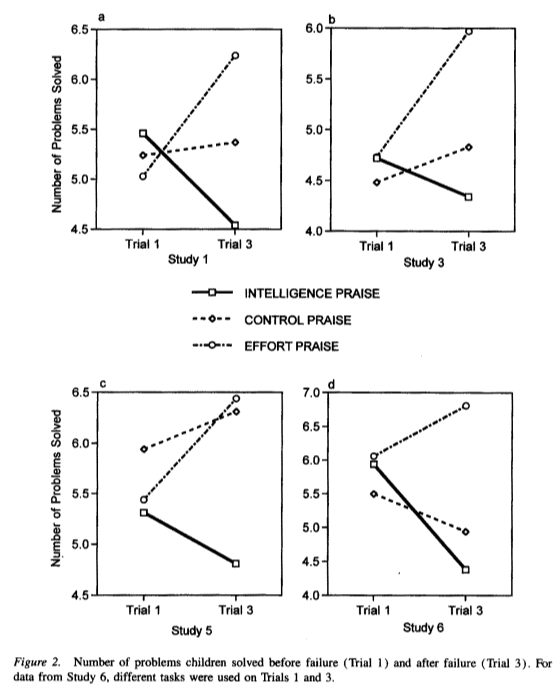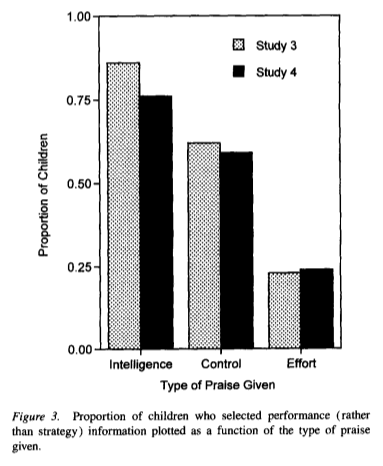How to screw learning with one simple belief
(You can suggest changes to this post.)

This. Right here. Look at it.
It’s a graph showing the performance of children after they’ve been praised for their intelligence (“you must be smart”) versus their effort (“you must have put a lot of effort into that”), and then given a series of hard problems to try to solve. The kids who are taught that effort is important increase in the number of problems they can solve. Those who are told that they’re smart show a frightening decrease.
What’s the difference? Those being told that they’re smart are taught that abilities are fixed. If you’re finding a puzzle hard, then it must be because you’re not very good at it, and you should try something else. Kids taught that results are based on effort see the hard puzzles as something they can learn to do, and then they do so¹.

This is shown really clearly in the second graph. Children are asked what type of puzzles they’d like to solve, and are given four options. The first three are pretty similar: “problems that aren’t too hard, so I don’t get many wrong,” “problems that are pretty easy, so I’ll do well,” and “problems that I’m pretty good at, so I can show that I’m smart.” However the last option is different: “problems that I’ll learn a lot from, even if I won’t look so smart.”
The first three options are “performance” options, they’re all about looking good, or getting things right. The last option is a “learning” option, and it values knowledge and growth over performance.
The second graph shows how often children selected performance options based upon the type of praise they were given. Children praised for their intelligence choose tasks which are easy and make them look good; children praised for their effort choose tasks which are hard, and which will teach them more.
This is important enough, but there are social ramifications as well. People with more fixed views of ability are more likely to adopt stereotypes, and are less likely to develop to higher levels of ethical reasoning than those with dynamic views of ability². And this doesn’t seem to have a damn thing to do with cognitive abilities; it’s all about outlook.
Do not go through life believing that you lack a talent, and do not allow others to believe that about themselves. Humans have an amazing capacity for growth; learning is hard, but it’s definitely worth it.
~ Paul
References
¹ Mueller, Claudia M., and Carol S. Dweck. “Praise for Intelligence Can Undermine Children’s Motivation and Performance.” Journal of Personality and Social Psychology 75, no. 1 (1998): 33. [pdf]
² Levy, Sheri R., and Carol S. Dweck. “The Impact of Children’s Static versus Dynamic Conceptions of People on Stereotype Formation.” Child Development 70, no. 5 (1999): 1163–1180. [pdf]
3 Myths That Block Progress For The Poor
The belief that the world can’t solve extreme poverty and disease isn’t just mistaken. It is harmful. Read more...
If you enjoyed this article, you may also like my video on how All Your Brains Suck.
 This site is ad-free, and all text, style, and code may be re-used under
a Creative Commons Attribution 3.0 license.
If like what I do, please consider
supporting me on Patreon,
or donating via Bitcoin (1P9iGHMiQwRrnZuA6USp5PNSuJrEcH411f).
This site is ad-free, and all text, style, and code may be re-used under
a Creative Commons Attribution 3.0 license.
If like what I do, please consider
supporting me on Patreon,
or donating via Bitcoin (1P9iGHMiQwRrnZuA6USp5PNSuJrEcH411f).
